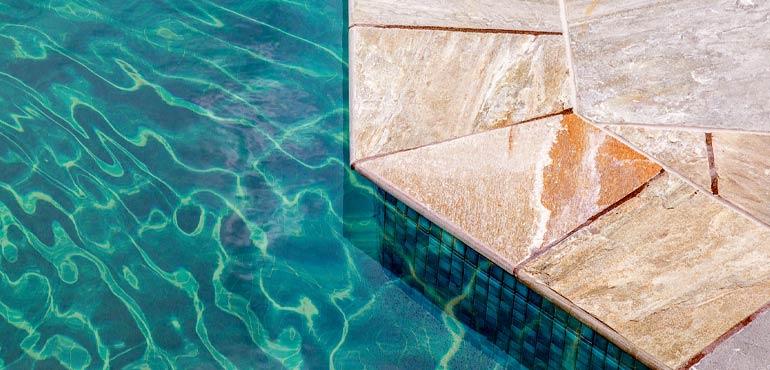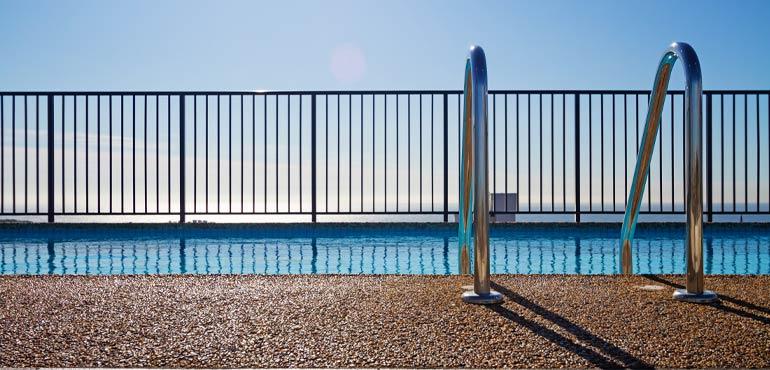Phishing alert: A phishing scam aimed at QBCC customers has been reported. Learn more...
Pool Safety Inspector—Licence surrender form
Your guide to hassle-free pool projects: Tips for Queensland home owners
There’s nothing better than relaxing by your own pool, but the process of getting there can feel overwhelming. Between approvals, safety checks, and paperwork, many Queensland home owners are surprised by just how much admin is involved in building or renovating a pool.
The good news? With the right preparation, you can save time, avoid common delays, and enjoy a smooth, stress-free experience. Here’s your go-to guide to navigating your pool project with confidence.
Understand the key approvals you need
If you are buying, selling or leasing a property with a pool you must get a pool safety certificate if there is not a current certificate in place, make sure you know what approvals are required. In Queensland, swimming pools must meet strict safety standards, including pool fencing, gates, and safety barriers, and you’ll likely need a pool safety certificate.
Tip: If you don’t have a pool safety certificate, you must submit a Form 36 Notice of No Pool Safety Certificate. You can now complete and submit this form online, saving time and reducing errors. Submit Form 36 online.
Choose a Licensed Pool Safety Inspector
Only licensed Pool Safety Inspectors can issue a pool safety certificate, and you can find one here: Pool Safety Inspector Search. If you’ve had an issue with a licensed Pool Safety Inspector, it’s important to know you can lodge a formal complaint.
Tip: Use the Form 1—Complaint Against Pool Safety Inspector to raise concerns. You can submit this form digitally for faster handling. Submit a Form 1—Complaint against pool safety inspector online.
Make sure you’re compliant before summer hits
Don’t wait until summer to check that your pool is compliant. Fixing fencing issues or re-applying for certificates can take time, so plan to avoid last-minute stress.
Tip: If you are requesting a refund due to an administrative error, duplicate, or system error relating to your pool safety certificate and want to request a refund, you can submit a Refund Request—Pool Safety Certificate Cancellation online.
If you made a mistake on a Pool Safety Certificate, you may not need to use this form. To change details such as:
- property location
- pool or owner details
- exemption or alternative solution
- minor repairs
Email the QBCC Pool Team at poolsafety@qbcc.qld.gov.au.
Include:
- your name
- your Pool Safety Inspector licence number
- the Pool Safety Certificate number
- details of the changes.
A member of the QBCC Pool Safety Team will respond to your request
Stay up to date with Pool Safety Laws
Queensland’s pool safety standards are designed to keep your family and the community safe. Take time to familiarise yourself with the latest rules around fencing, gate latches, and signage.
Most delays in pool approvals happen because forms are incomplete or missing information. Submitting forms online helps ensure your paperwork is complete and ready to be submitted saving you time and avoiding costly rework
Shut the pool gate this summer
December marks the launch of the "Check Your Pool Gate" initiative, serving as a timely reminder for Queenslanders to prioritise pool safety as summer approaches.
The Queensland Building and Construction Commission (QBCC) urges people to check their pool is safe and educate those around them on their pool safety responsibilities, including keeping the pool gate firmly shut at all times.
Pool owners are required by law to ensure their pool is fenced and meets the swimming pool safety standard. The standard covers:
- the required height and strength of fences
- non-climbable zones
- gates and their self-closing and self-latching requirements
- how to prevent direct access from a building into a pool area
- mandatory CPR signage
A swimming pool is defined as an above or belowground structure and includes all temporary pools and spas (including small inflatable pools) that can hold 300mm of water or more.
While active adult supervision is recommended when children are swimming, sadly many young lives are lost each year in drowning related incidents; half of those tragic incidents occurring in backyard swimming pools.
To assist in keeping children safe, the QBCC recommends:
- removing furniture or structures that children may climb to access the pool
- packing away pool toys
- never leaving pool gates open – propped or tied back
- checking the pool fence, gates and access meet safety standards on a regular basis
Additionally, all rented properties with pools are required to have a pool safety certificate. Pool safety certificates can only be issued by QBCC licensed pool safety inspectors – confirming the pool is compliant at the time of inspection.
Pool safety certificates are valid for one year for shared pools and two years for non-shared pools, and are required when buying, selling or leasing a property. If you are not selling, buying or leasing your property your pool barrier still needs to be compliant.
Useful resources
More information on pool safety compliance is on the QBCC website and people can also search the pool register to find out if a pool at a particular address meets safety requirements.
Alternatively, more information can be found via the below resources:
Home owner's guide to building and renovating
Pool safety in Queensland—the role of the QBCC
The Queensland Building and Construction Commission (QBCC) is an independent statutory authority that regulates Queensland’s building and construction industry. This includes overseeing pool safety laws.
When it comes to pool safety laws, the QBCC are responsible for:
- licensing pool safety inspectors
- investigating complaints
- auditing
- enforcement action, and
- maintaining a register.
We have a different role to the elected state government, the Department of Housing, Local Government, Planning and Public Works, and local governments.
The elected state government makes decisions about policy matters and creates building standards and laws which govern the industry.
The Department supports the state government by giving advice and recommendations, implementing decisions and drafting laws.
Local governments also have a role in pool safety, which includes:
- enforcing compliance with the pool safety standard
- entering properties to inspect pools
- issuing fines or prosecuting owners of non-compliant pools
- considering impracticality or disability exemptions for pool fences
- cancelling pool safety certificates for non-compliant pools, and
- declaring areas as ‘remote’ to minimise inspection costs for pools in remote areas.
For more information on pool safety, visit Swimming pools and follow us on social media. See links at the bottom of this page.
More information
Guide to pool safety for homeowners
Find a local contractor
You can find a licensed local contractor in your area:
Make sure your pool fence measures up this summer
With the weather heating up in the Sunshine State, homeowners and occupiers are being encouraged to make sure they know the pool rules.
In Queensland, all swimming pools and spas that can hold more than 300 millimetres in depth of water must have a compliant safety barrier to restrict children from accessing the pool area.Queensland Family and Child Commission (QFCC) Principal Commissioner Luke Twyford said the number of drownings and non-fatal immersions registered in Queensland over the past decade was concerning.
“Drowning is the leading external cause of death for Queensland children younger than five, which is particularly distressing given it is considered preventable,” Mr Twyford said.
“Queensland’s child death register shows 40 children aged 0–4 years drowned in regulated pools between 2011 and 2021 and a further 853 required medical attention resulting from a non-fatal immersion.
“Concerningly, the numbers we are seeing around child deaths suggest pool owners may be becoming complacent when it comes to pool safety.
“Queensland has strong and robust laws when it comes to swimming pool fencing, but fences are only effective if they are properly used and maintained.
“This SWIMSAFER Week, we’re asking everyone to revisit swimming pool safety—that means making sure your pool fence is compliant, avoid deliberately propping the gate open, ensure the gate is self-latching and self-closing, removing obstacles that children can use to climb the fence, and always ensure young children are actively supervised while in the backyard.”
Queensland Building and Construction Commission (QBCC) Commissioner Anissa Levy said owners of properties with swimming pools are responsible for pool fence compliance.
“Pools and spas can be a lot of fun, but safety should always be at the forefront of our minds,” Ms Levy said.
“Every pool owner is legally responsible for ensuring their pool barrier complies and that the barrier is always kept in good condition.
“An on-the-spot fine of more than $2,000 for homeowners and more than $6,000 for a body corporate can be issued for failure to obtain a safety certificate as required when they buy a home with a pool.
“Short-stay accommodation providers must also have a valid pool safety certificate when renting out a property with a pool. This includes owners who decide to rent out a holiday home, part of their home, or even just a room, as short-stay accommodation.
“Failure to ensure a pool gate is securely closed at all times when not in use is an offence carrying a maximum penalty of over $23,000–this includes propping a pool gate open.”
While local councils are responsible for taking enforcement action over non-compliant barriers, the QBCC licenses pool safety inspectors (PSI).
“In 2021–22, the QBCC received 30 complaints against PSIs. Of these, 19 received disciplinary action that resulted in fines,” Ms Levy said.
“If a pool safety inspector doesn’t thoroughly inspect every aspect of the fence and doesn’t do multiple tests to ensure the pool gate self-closes and self-latches from every open position, including resting on the latch, they cannot be doing a thorough inspection and may overlook nonconformities.”
Ms Levy also reminded everyone to familiarise themselves with pool fencing and gate requirements including those around inflatable pools.
“These pools are a drowning risk for children, and people who install them without the appropriate fencing can be hit with on-the-spot fines of more than $900,” Ms Levy said.
“Last financial year, 40,638 pool safety certificates were issued, which included 33,271 for non-shared pools and 7,367 for shared pools.
The QBCC referred 32 properties to local governments in 2021–22 because the pool barrier was unsafe.”
For more information on pool safety and compliance visit the QBCC website and if you have concerns about a potentially noncompliant pool, notify your local council.
BACKGROUND
Queensland Health immersion reports are provided to the relevant local government, which is required to inspect the site of the immersion.
If the local government inspection raises concerns about the pool fence at the site of the immersion, the local government takes enforcement action to ensure the pool complies.
If the local government inspection suggests a breach by a pool safety inspector, it is referred to the QBCC, which takes action with the relevant inspector.
Pagination
- Page 1
- Next page



